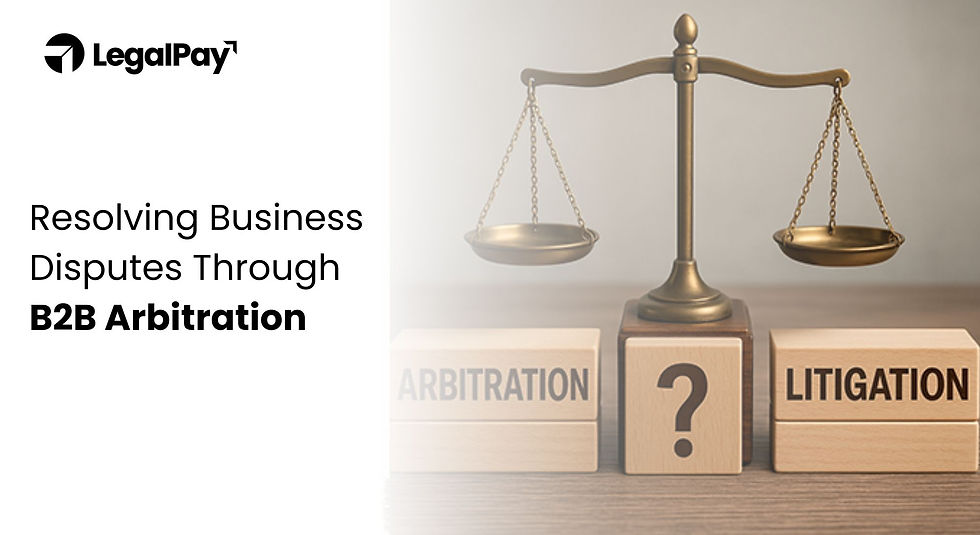Shareholders Class Action and Litigation Funding
- LegalPay

- Mar 2, 2023
- 6 min read

Introduction to Litigation Funding
Litigation Funding is an invested working capital by a third party in order to cover the legal expenditure of a party initiating legal proceedings in return for a portion of proceeds arising out of the recovery from court judgment/arbitration award. While Legal insurance and contingency fees are based on pre-litigation payments/fixed policy premiums, litigation financing is entirely done on a non-recourse basis i.e., the funded party does not bear any adverse costs if the funded party loses the case. This non-recourse funding is essentially why litigation financiers differ from conventional legal insurers.
Litigation Funders take a share of the proceeds either as a pre-decided percentage of the sum recovered or a multiple of the funds provided.
Litigation Funders are extremely effective in amicably settling disputes between clients before the case reaches the court. Statistics from the largest litigation funder in the world- ‘Omni Bridgeway’ based out of Australia; show that from the period of October, 2001 to December 2011, 130 funded cases were completed; of these, 89 (68%) settled; 12 (9%) succeeded at trial; 4 (3%) lost at trial; and 25 (19%) were withdrawn. This is proof that litigation funding acts as a tool for access to justice.
Flexible funding arrangements
Newer ways of third-party funding are ever-evolving in the financing sector. From portfolio financing to purchasing equity shares in the claimant entity, Litigation Funders now establish Special Purpose Vehicles (SPVs) to receive investment funds from a variety of sources including both domestic and international family offices. Australian law has exempted Litigation Funders from obtaining an Australian Financial Services License (AFSL); a license required by companies to deal in financial products, securitization, and insurance business. Litigation Funders are also exempted from Managed Investment Scheme (MIS) which regulates how wealth managers and other asset-pooling entities operate in the Australian financial markets.
Ethical issues with Litigation Funding
A Litigation Funder has no direct interest in a third party’s litigation. The basic premise of opposing litigation financing is that it falls within the definition of ‘Champerty’. The idea of ‘stirring up strife’ leading to a litigious culture in a society with Litigation Funders at the epicenter of it is what underlines the idea of Champerty. Canadian Law prohibits champerty at common law, In the Act Respecting Champerty RSO (1897) (the Champerty Act), champerty is forbidden and invalid where “Champertors be they that move pleas and suits, or cause to be moved, either by their own procurement, or by others, and sue them at their proper costs, for to have part of the land in variance or part of the gains”.
Public policy concerns advocate the view that litigation funders avoid liabilities arising out of unsuccessful claims. However, if poor laborers suppressed by landowners by having their property robbed of by the latter have no money to sustain a remedy at law, then seeking financial help in form of money or an attorney to redress for his wrong is not any crime of maintenance. Further, any third-party assistance in such situations does not hurt the integrity of the litigation process and in fact, serves as an alternative access to justice. The Indian Supreme Court has held that there is no restriction on third parties funding litigations and receiving a commercial percentage after the outcome of the litigation.
Class Actions suits and litigation financing
There are situations where consumers, investors, and shareholders have claims against a corporate entity but their individual claims are trivial in comparison to a class where all claimants having the same cause of action against the entity club together to seek remedy at law. This regime is particularly beneficial, as it lends legitimacy to individual claims, vindicates their justness, and encourages proper behavior by wrongdoers. Litigation funders are quite helpful in forming a class of legitimate claims who are signatories to a funding agreement from those who are not. Since, class action suits are not simply disputes between private parties and private rights and have far-reaching consequences in terms of corporate governance issues including disclosures in the securities market, prohibiting cartels, or protection of minority of shareholders, therefore, litigation funding must be viewed as a channel to promote alternative access to justice.
Class-action suits are nowadays not possible without third-party funding. In Australia, from September 2013–September 2016, approximately 49% of all class actions filed in the Federal Court were funded by third-party litigation funders. From 2013 to 2018, the percentage of funded class action proceedings grew to 64%, with funded class action proceedings filed in the final year of that period constituting 78% of all filed class actions. While the nature of most of the class action suits has been shareholder disputes, only 34% of the conflicts have been consumer disputes in general. Few were also mass-tort claims.
Litigation funders in Australian jurisdiction are also increasingly resorting to After-the-Event (ATE) insurance which insures the litigating party in case of an unsuccessful outcome, for adverse costs and other disbursement costs. The Insurance can only be claimed after the dispute has arisen. Such policies are also entered into conjunction with a separate litigation funding arrangement in order to offset a portion of the funder’s risk.
The Australian case of Money Max highlights the general process followed by litigation funders in class action suits. The major issue in class action suits usually is of ‘open class’ and ‘closed class’. Since Australian law allows class members to opt out, the class remains open for a short period during which members are notified of their rights to opt out of the proceedings and required to register with the applicant’s solicitors through a class member registration process, should they wish to make a claim.
It is also notified the litigation funder that all class members will be bound by the settlement or judgment but only those members who are registered with the applicant’s solicitor will be entitled to any benefit under the settlement/ judgment. Such a class becomes closed and the members part of it, become entitled to the benefits arising out of the terms of the funding agreement.
A closed class is beneficial to the respondent because then, he can ascertain a settlement amount. He must be sure of any exposure of any future claims. A class action can only be successful if the opposite party can calculate the quantum of claims against it.
Funded and Unfunded class members
Unfunded class members (who have not signed the third-party funding agreement) are sometimes made subject to Common Fund Orders (CFO). CFO is well-defined under Australian law in the Federal Act, of 1976.
Common fund orders typically require all members of a class to contribute equally to the legal and litigation funding costs of the proceedings regardless of whether the class member signed a funding agreement. These orders require all class members who seek to benefit from the proceeds of settlement or judgment to contribute equally to the cost of legal representation and litigation funding costs, irrespective of whether or not they were a signatory of a funding agreement.
An equalization order is an order where the Court orders unfunded group members to have their recoveries deducted by an amount equivalent to the funding commission that would otherwise have been payable under a funding agreement. This amount is then disbursed amongst funded members on a pro-rata basis. However, the funder’s commission fee is capped and does not receive any share of the proceeds deducted from the unfunded members.
Australian courts can regulate and cap the commission fee charged by litigation funders in open class action suits. Therefore, funders prefer closed classes in class action suits, given the uncertainty and timidity in the litigation funding market.
Indian litigation funding market
Under Indian law, no provision with respect to close or open class action suits is present. Also, there is no judicial precedent on any common fund orders or equalization orders. Therefore, there appears to be huge scope for litigation funders in India like LegalPay to manage class participants, ascertain claim amounts, especially shareholder class action suits to prohibit cartels, foster safe pharmaceuticals, and prevent public healthcare crises. Dorajay Pty Ltd v Aristocrat Leisure Limited (Aristocrat) was the first shareholder class action suit where a senior executive of Aristocrat had brought an action for wrongful dismissal. In its defense, the listed company advanced a case that it was entitled to dismiss the executive for a number of reasons, including for failing to disclose material information to the market of investors in Aristocrat shares, thereby foreshadowing the possibility of civil liability to investors for a breach of a continuous disclosure obligation.
Class Action suits came to be defined under section 245 of the Companies Act, 2013 after the government felt the need to have one after the failure of the courts to redress the grievance of shareholders to pursue a securities class action suit where their claims were rejected on the reason that there are no relevant laws in place in India to deal with such class action suits. The investors of the company had to finally move the court in the United States seeking redressal and were awarded a sum of 125 million dollars as compensation.
LegalPay is India’s largest third-party litigation funder and is here to help aggrieved shareholders and consumers in financing their collective actions.




Comments